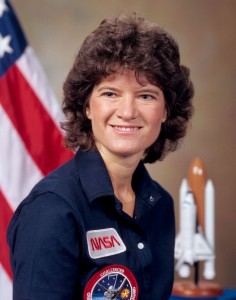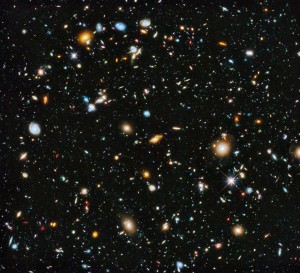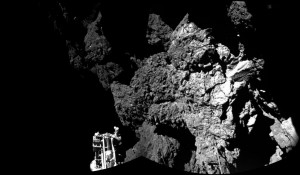Last week humanity (read in this case the European Space Agency) put a lander on a comet, a lander launched ten years ago to travel over 800 million miles. The landing was livestreamed and I, along with four hundred thousand other people, watched with bated breath as control tried to communicate with the lander. It’s a 27 minute round trip for any information, so tension was high. It didn’t go quite as planned, the harpoons didn’t deploy, but the lander is out there. Twenty-seven minutes is a lot of time to think, and my first thought was “This is way more tense than the Superbowl.”
Space exploration should be the new sports.
Tension
Tension is a really important part of sports. The anticipation before a kick, that moment between the throw and the crack of the bat. An open net, a power play, teams and athletes taking risks in order to win big. Even slower paced sports like curling trade on this tension. The game doesn’t happen in the score, it happens on the field, where things can change in a moment. If tension’s what you’re looking for in a sport, the space exploration has got it. The Rosetta mission launched a hundred kilogram object at a comet four kilometers across. It’s like hitting a baseball to a specific fan, if that fan were in the parking lot of the bank across the street. It took ten years to get there, and even then there’s a twenty-seven minute delay on communications. Maybe your ten year mission comes to nothing when your lander straight misses a comet. Maybe it doesn’t. Twenty-six more minutes to find out!
Achievement
Sports is about more than tension, though. It’s about excitement, achievement, and snatching victory from the jaws of defeat. It’s about your team, and your team going all the way, even when they’re losing (half of the people I knew are Toronto Maple Leafs fans. The other half are Chicago Cubs fans. Go figure). Sports are about winners staying afloat and underdogs rising to the challenge. that’s what makes them amazing. Well, in the universe, we are underdogs. Everything is so far apart that we can’t get there in our tiny mortal lives, and most everywhere outside our atmosphere will kill us instantly. But here we are sending out probes and landing people on the moon anyway, because our curiosity and ambition trump our apathy and fear. But we lose sometimes. We lose landers, we lose time, and we lose good people. But when we win, when we unravel a mystery or get just a little bit farther out past the sky, everyone wins.
 Athletes
Athletes
I know enough about professional athletes to know that I don’t know enough. I know that they work hard, a lot harder than they often get credit for, often risking lifelong personal injury for the sake of a victory or two. It’s a high pressure occupation, made moreso by the celebrity that comes attached to professional athletes in major league sports. In space exploration, the heroes and the role models are engineers, astrophysicists, ground crew chiefs, biologists, and usually several of those things at the same time. Sally Ride had a doctorate in physics from Stanford, and Chris Hadfield has a degree in aviation as well as being an accomplished pilot. Let me spell out how that role model commercial goes, “If you throw a ball well, you can be a star. Stay in school and you can help visit the stars.”
 I want Monday night updates from NASA. I want astronaut training, engineering commentary, and trading cards. I want reviews of research papers leading to speculations about the ESA’s recruitment for various projects and missions. I want glitter and pizzazz. I want theme music. I want to gather around computers and televisions with hundreds of thousands of people to watch humans reach out into the universe. I want to cheer, laugh, and cry with them.
I want Monday night updates from NASA. I want astronaut training, engineering commentary, and trading cards. I want reviews of research papers leading to speculations about the ESA’s recruitment for various projects and missions. I want glitter and pizzazz. I want theme music. I want to gather around computers and televisions with hundreds of thousands of people to watch humans reach out into the universe. I want to cheer, laugh, and cry with them.
Space exploration is a game we can all play at home, we just have to look up.

